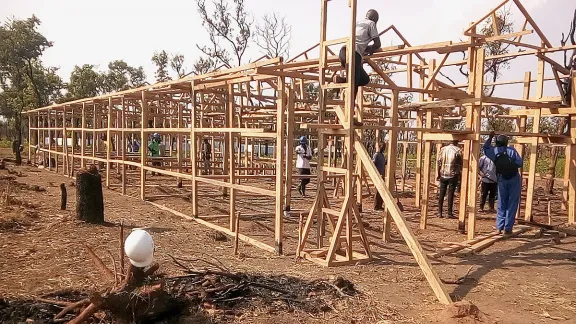
The construction site of the new health center, which will benefit about 14,00 Congolese refugees and nearby host communities. Photo: LWF Angola
New clinic for more than 13,000 Congolese refugees
(LWI) - Better access to health care: the Lutheran World Federation (LWF) is constructing a health center in Lovua refugee settlement, northern Angola. It will serve more than 13,000 Congolese refugees in the camp, who would normally have to walk up to 24km to receive medical attention.
The outbreak of violence in the Kasai region of the Democratic Republic of the Congo (DRC) in March last year triggered the internal displacement of some 1.4 million people and the flight of over 31,000 refugees. Refugees reported a wide range of human rights abuses including mass killings, mutilations, burning of property, destruction of villages, schools and churches, rape of women and girls, shortage of food and the lack of access to basic services and goods.
Nearest hospital 24km away
The majority of the refugees went to Lunda Norte Province, Angola. The DRC-Angola border serves as a main channel for trade between the two countries, and many Congolese have worked in Angola before. Lovua refugee settlement is the latest addition to housing refugees in Northern Angola. Almost 14,000 people, about 61% of the Congolese refugee population in northern Angola, have already moved to Lovua. The refugee settlement has a total planned population capacity for approximately 36,000. Three quarters of the people living in Lovua are women and children.
Many come from the overcrowded Cacanda reception center near Dundo, but other than the reception center, Lovua to date did not have any health care facilities. The camp has neither a mobile ambulance in case of emergencies, nor a proper clinic. The nearest government hospital is located 16km away from the refugee settlement. As hardly any of the refugees have a car, people living at the furthest point of the settlement have to walk more than 24km to receive medical attention.
Vaccinations, contagious diseases and maternity care
The clinic LWF is constructing in partnership with UNHCR will be centred in the middle of the settlement, and also provide health care for nearby host communities. It has screening and treatment rooms, admission wards, a maternity and vaccination wing and an isolation ward for patients with complicated or contagious diseases. There are also showers and sanitation facilities, as well as an outside shelter serving as waiting room where the patients and family members can rest. Once construction is finished, Médicos del Mundo, a Spanish NGO, will provide the health services. “It looks great!” Fernando A. Flores, Associate Program Officer, UNHCR Field Office Dundo said. “The clinic will be a much needed addition to the settlement.”
When I see the people here, especially the elderly, children and mothers carrying their babies walking such long distances to the nearest government clinic, I feel so sorry. The sight of them motivates us to work overtime and on weekends, to make sure the clinic opens soon.
“The work was challenging but we are working very hard to ensure that the clinic is completed by the end of this month,” says LWF construction supervisor, Henriques Kalau. “When I see the people here, especially the elderly, children and mothers carrying their babies walking such long distances to the nearest government clinic, I feel so sorry. The sight of them motivates us to work overtime and on weekends, to make sure the clinic opens soon.”
Long-standing engagement in Angola
LWF was among the first humanitarian actors in Dundo, assisting the DRC refugees when the crisis started in April 2017, responding in the main four emergency response areas. LWF established Lovua camp, installed shelter, water tanks and latrines and is now responsible for the entire infrastructure in Lovua, which includes a system of solar panels, a transit centre and the new clinic.
LWF has been working in Angola since 1986, when it was one of the major aid organizations providing emergency relief and rehabilitation at the height of the Angolan civil war. Since the peace agreement in 2002, the work in Angola has transitioned to a long term development program focusing mainly on integrated rural development, land rights and human rights through the UN Universal Periodic Review process.


